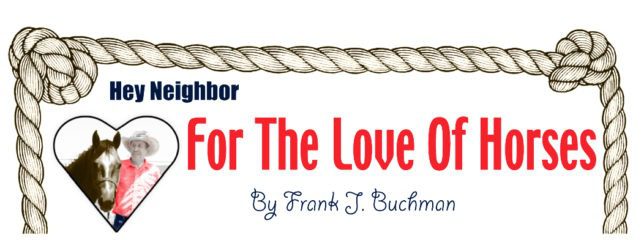As the music came on the microphone, Aaron Ralston loped into the arena on his bridle less horse, circled both directions at various speeds, occasionally clapping his hands and asking the crowd to join in, before spinning both directions, coming to a
sliding stop for which he is most famous, and then backing his mount several yards.
As the first clinician at the recent Equifest of Kansas in Wichita, Ralston discussed the importance of rhythm in free style reining and of equal value while riding in every discipline.
Ralston is a native Colorado horseman who spent much of his younger years in the rodeo arena. After working for nationally-recognized reining horse trainer, Doug Milholland, Ralston returned to western Colorado, near Glenwood Springs, where he has a horse training business.
Initially specializing in reining and roping, Ralston later expanded to include reined cow horse (cutting, reining, fence work), ranch horse versatility and ranch sorting.
In 2006, Ralston competed as a member of the gold-medal-winning U.S. reining team at the World Equestrian Games in Aachen, Germany, where he also brought home the individual bronze medal riding Smart Paul Olena.
Last year, Ralston returned to the World Equestrian Games in Lexington, Kentucky, as NBC Sports “on-air”commentator for the nationally televised reining events.
Ralston also hosts the Cow Horse Productions feature called “The Ride” on RFD-TV every Monday. It is filmed on ranch locations and in arenas throughout the country and takes a creative look at reining, roping, cutting and other work. He spotlights skilled horsemen and rides with them, sharing the experience with the television
audience.
At the recent 2011 National Western Stock Show Freestyle Reining Competition in Denver, Colorado, Ralston placed third riding Spendin Peptos Money owned by Rheta Strong of Snowmass, Colorado Perhaps more importantly, Ralston won the “People’s Choice” award for his performance.
It has been announced that Ralston will be featured clinician for Celebrate the Horse, the Northwest’s premiere equine event, in Lynden, Washington, October 1-2. He will participate in Saturday night’s VIP activities and stay over the next week for a clinic at the fairgrounds.
“Free style reining is a personal favourite event of mine,” Ralston claimed. “I love the sport of reining, and everybody enjoys music. What could be better than combining the two?”
Although most people, including a number of seasoned professional horsemen, don’t realize it, but “every horse has a beat,” according to Ralston. “Music relates to the internal dialogue of every horse.”
Moreover, the rider’s attitude is always reflected to his horse, Ralston pointed out. “People typically use their horses as a relief, and when a person’s day has gone bad, that is when there will be trouble with the horse,” he explained.
“Like it or not, we are always training when we are riding our horse,” the clinician continued. “The horse can pick up our feelings
“Our hands are the direct line to a horse’s rhythm and getting in beat with it,” Ralston demonstrated. “One, two; one, two, three, one, two; one, two three.”
Consistency is the key to a rhythmical relationship between the rider and his mount. “If the rider doesn’t send the same direction each time something is expected from the horse, he will make up his own mind and start second guessing,” Ralston detailed. “Our horse depends on us for guidance. Our horse becomes what we think about
most.”
Different songs create a different mood in the rider and his mount, demonstrated Ralston, as various slow, next fast and then jazzy tunes were played on the sound system.
“Find that drum beat. That rhythm and dialogue that tells your horse what you want him to do,” Ralston repeated.
In free style reining competitions, judges look for the rhythm of music that fits the horse.
“Some horses fit a slower beat that can almost put everybody to sleep, but a higher strung horse must have an upbeat tempo to perform to his potential,” Ralston said.
Although understanding the depth of rhythm’s importance to a horse is difficult for many people to comprehend, the clinician emphasized, “The worst thing for a rider is to not have a song, a rhythm, that internal dialogue with your horse.”
However, every horse responds differently, Ralston admitted. “There are many different ways to develop a horse’s potential, and it’s not an over night deal. What might be one horse’s rhythm is not the same in another horse.”
Seeking questions from the audience, Ralston related that no matter what sequence is used by the horse and rider team in a free style reining competition, circles, spins, rollbacks and sliding stops are part of the judging.
“You must have the correct maneuvers no matter if riding bareback, bride less, and whatever the music, it still boils down to the individual performance,” he contended.
“Whenever riding, you must always think about your internal song, your rhythm and the internal dialogue with your horse,” Ralston concluded.
+++
